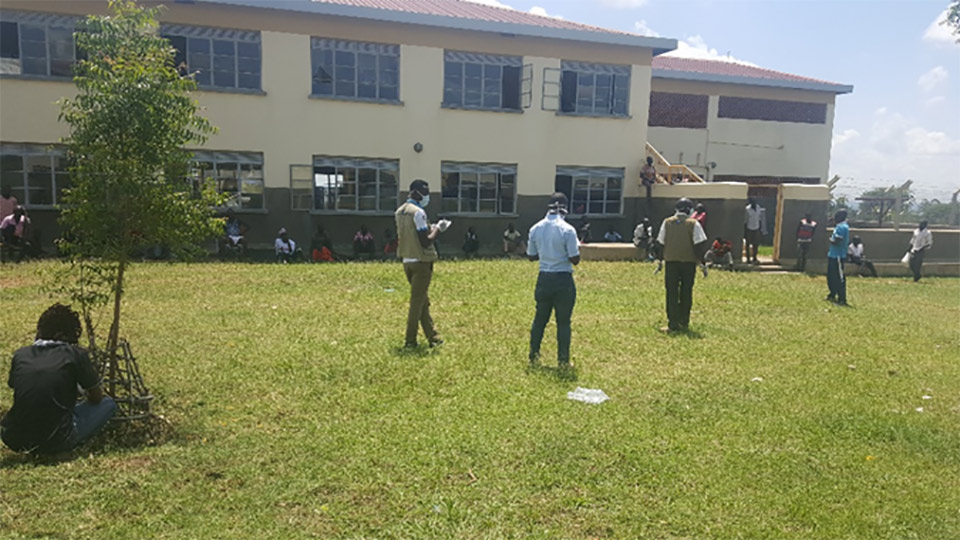UN Women provides psychological support to women refugees in Uganda: “Had it not been the psychosocial support I received; I would have died of stress than COVID-19”
Date:

UN Women in partnership with its local implementing partner, TPO have been carrying out Psychosocial support in the quarantine centres as well as the refugee settlement. So far since the COVID-19 period, a total of 2107 refugee and hosts (1560 F and 547 M) have been reached with Psychological first aid, psychoeducation, basic counseling, specialized counseling, recovery follow up and messaging on prevention of SGBV and COVID-19. The programme is funded by Embassy of Sweden in Uganda under the Joint Program on Ending Gender Based Violence and the EU Spotlight Funding Initiative to UN in Uganda.
The situation in the quarantine center requires psychosocial support at the time of joining, and during the two weeks, sometimes longer stay at the center. Most newcomers spend most of their time in deep thoughts. They lack basic needs like sanitary wear, clothes, soap, safe water, and food is not served on time. Some are not connected to their families especially those who do not have phones.
Harriet Athieng (Not real names), is a 29-year old refugee from South Sudan who lives in Bidibidi Refugee Settlement. Harriet is one of the 25 women and 50 men in Lokopio Quarantine center. She was transferred to this quarantine facility in May 2020 with her 5 children aged between 1 and 15 years. “Had it not been the psychosocial support I received from TPO – a UN Women’s implementing partner, I would have died of stress than COVID-19. I was ever deep in thoughts. I had so many unanswered questions and no one was there to give me answers. I used to worry a lot by the fact that I am nine months pregnant. I was counselled and advised to avoid stress because it could affect my pregnancy. The counsellors also advised me together with my children to social distance, wash hands regularly and make myself busy to avoid negative thoughts. This has helped me a lot. When local leaders came to pick us for quarantine, they found when my husband had already left. Because he stays at the Ugandan - South Sudan boarder town. They took me and my children to the Lokopio quarantine centre in Yumbe district in west Nil, where we have spent more than a month. We did not pack our clothes because we expected to stay for three days. I was almost worried of everything; from the food, to clothing, beddings, health of my children, and my health as an expectant mother. Up to now, I don’t have clothes for receiving my baby in case I give birth from here. I have no soap, no basin, and no sanitaryware. The doctors also do not come to the quarantine center every day.
After receiving counselling from TPO, I realized there was no reason to stress myself with issues I had no control over. I just developed a positive attitude towards my life. Together with my children, we have tested negative of COVID19 three times, but five people from this center tested positive which led to extension of our stay. I am no longer worried.”
Harriet is one of the women refugees who have received psychosocial support on COVID19 in the Quarantine centers. “COVID 19 increased mental health and psychosocial challenges among refugees and host communities, yet the response does not have enough support to address the needs. Health workers are over stretched and sometimes may not have the necessary skills to respond to psychosocial needs of those in quarantine-including for the women. The MHPSS is intended to save lives and build resilient of refugee and host community members, to avoid any major mental health crisis related to the COVID-19 pandemic.” Said Yusrah Nagujja, Programme Management Specialist, UN Women Uganda.
As a result of the Psychological First Aid, refugee women have learnt how to live positively in the quarantine centers especially the anxiety related with waiting for the COVID-19 test results. There is also reduced anger and sadness among the clients whereby they are able to control emotions, and some have started observing Standard Operating Procedures related to COVID-19 prevention. They are also prepared for life after discharge from the quarantine centers.